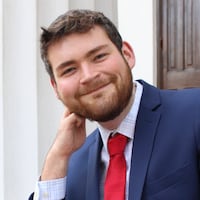A united group of Suwanee residents dressed in blue crowded into a Tuesday meeting to question and condemn a proposed amendment to the city’s zoning ordinance.
Suwanee Planning and Zoning Commissioners recommended approval of the “planned park neighborhood” amendment, which would create a new type of special-use permit in certain zoning districts for which residential developers could apply.
The amendment would allow developers to build homes without minimum lot sizes, setbacks or distances between lots. In return for denser projects, developers would set aside land to construct amenities or preserve environmental areas.
Residents held reservations about the permits, worried that it could allow developers to shoehorn dense developments on small properties and bypass the city’s comprehensive plan — a guiding document that includes the type of development expected in specific areas over the next few decades.
“In my 40 years here, I’ve never seen a more egregious attempt to bypass our zoning laws that have protected us for all these years,” said Suwanee resident Tom McConnell during a public hearing. “We did not buy into low-density areas and invest our hard-earned money to have a developer invade our streets and neighborhoods with more homes.”
Suwanee officials would continue to use its comprehensive plan when considering new projects from developers, even those that seek one of the special-use permits, said Planning Director Josh Campbell.
The Gwinnett city grew by more than 35% over the last decade, according to U.S. Census data. More than 20,000 people now call Suwanee home, compared to about 15,000 in 2010. Several residents at Tuesday’s meeting expressed concerns over traffic worsening if too many people move to the area at once.
Tensions rose in Suwanee earlier this year when Toll Brothers proposed building 263 homes on 132 acres on Settles Bridge Road. The developer postponed its rezoning request, which some residents believe influenced the city’s decision to consider the amendment.
Campbell told The Atlanta Journal-Constitution that the developer “didn’t have anything to do with the city’s decision to pursue the planned park neighborhood” amendment. But he expects Toll Brothers to resubmit if and when it passes.
Officials initially tabled the amendment earlier this year after residents questioned it. Following the board’s Tuesday recommendation for approval, City Council is set to cast the final vote on Sept. 28.
David Martinez, who’s running this year for a seat on City Council, said during the hearing that the ordinance could put a strain on the local school system and city infrastructure. He asked that the ordinance be “thrown away,” as the city already has “sufficient zoning laws that are beneficial to the entire community.”
“We built (our) home with the intention of having more privacy and being able to accommodate large gatherings with family and friends,” Martinez said. “... The proposed zoning (amendment) hinges on the individual property rights of current homeowners who live in quiet and established neighborhoods.”
The number of homes allowed in specific zoning districts under existing regulations would still be followed, Campbell said. But the homes could be built on smaller lots or more closely together, giving developers flexibility to add other features to the project with the remaining acres, he said.
“Shoot, it could be just a pasture that they think looks nice and they want to keep as an open space for kids to run around and play in,” Campbell said. “... There are lots of things that (someone) could accomplish when you ask (them) to be creative.”
Any developer who seeks one of the permits would be required to undergo a “pre-application conference” and submit conceptual plans for the project. Public hearings for each development would be held at both Planning and Zoning Commission and City Council meetings.
The amendment would help the city maintain a higher quality of architecture standards and hold developers accountable for their plans by placing conditions before approving special-use permits, Campbell said.
But after Tuesday’s meeting, many residents remained skeptical of the benefits promised by officials. McConnell said he’s working to alert other residents about it before the City Council votes in September.
“This ain’t my first rodeo,” McConnell told the AJC. “... We’re going to get the job done. Trust me, I’ve done it before.”
Here’s the original version of the proposed amendment to Suwanee’s zoning ordinance. Planning and Zoning Commissioners made minor changes to the language of the ordinance at Tuesday’s meeting.
About the Author
Keep Reading
The Latest
Featured


